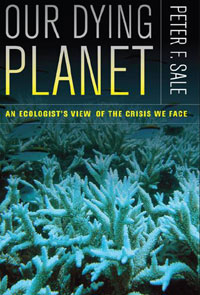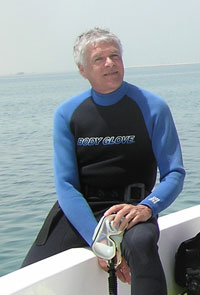The debate over what to do about climate change needn’t pit economic progress against environmental preservation, according to Peter Sale.
“It’s a false dichotomy,” says the professor emeritus in biology and author of Our Dying Planet: An ecologist’s view of the crisis we face. “You create an either or situation: either you have economic prosperity or you have a pristine environment. The truth is that we can have a rich culture, a prosperous economy and a clean, sustainable  environment.”
environment.”
An assistant director of United Nations University’s Institute for Water, Environment and Health, Dr. Sale will be in Windsor on Thursday, November 3, to deliver a free public lecture called Our Planet Does Not Have to Die. Since the book’s release, he’s been doing interviews and campus speaking engagements to promote it, and to further his message that it’s not too late to save the planet from the environmental damage that has been wreaked on it.
“There is still time to salvage most of what we are destroying and there are ways to transition toward a future that combines a high quality of life and a sustainable environment that is biologically diverse,” he writes in the book’s introduction. “The choice is not between economic progress and environmental conservation, or even between civilization and the natural world – it is between an intelligently managed, low impact but advanced civilization and the widespread disaster that will come if we continue business as usual.”
Sale taught at UWindsor between 1994 and 2006 and a considerable  portion of his research has been focused on coral reef ecology. He’s made a dire prediction that coral reefs could disappear from the face of the planet by 2050 and suggests they’re the environmental canary in the coalmine.
portion of his research has been focused on coral reef ecology. He’s made a dire prediction that coral reefs could disappear from the face of the planet by 2050 and suggests they’re the environmental canary in the coalmine.
“If we lose coral reefs, the world will go on, but what does that say about us as a race?” he asks. “Do we realize what we’re doing? And what else are we willing to sacrifice?”
Besides disappearing coral reefs, Sale’s book examines overfishing, the exploitation of forest ecosystems and our impacts on oceans and atmospheres. It questions why humanity is failing to see just how serious a problem environmental degradation really is, and offers thoughts on how we should respond.
“It’s naïve to think that the world will recover on its own,” he said. “We’re not in the process of eliminating all life, but we are in the process of causing mass extinctions. The only way we’re going to improve the situation is if the population wakes up to the problem and starts demanding changes to policy.”
Sale will speak on Thursday, November 3, at 7 p.m. in room 200, Toldo Health Sciences Centre. The University Bookstore will offer copies of his book for purchase.

